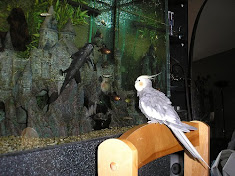All turtles are different and you will need to feed your turtle a specific diet depending on what species of turtle he/she is. Some turtles enjoy specific foods more than others but generally there are vitamins and minerals that all turtles need in their diet and these are vitamin D3,vitamin A and calcium. So why are they important and how can I introduce them into my turtle's diet?
 |
| Box Turtle by Ed from Ohio |
One thing to keep in mind is that turtles are not used to extremely cold temperatures so if the weather is not particularly warm in your area it's always better to stick with UVB lighting.
Calcium is extremely important for good turtle shell development and healthy bones in turtles. If there is a lack of calcium in a turtle's diet it can cause severe problems to both land and aquatic turtles alike. The shells of aquatic turtles will become soft and rubbery and it's very possible that a young calcium deficient turtle will develop malformed limbs. Land turtles on the other hand can suffer from pyramiding which is a condition that causes the shell of a tortoise to become lumpy and form pyramid-like deformations. The cause of pyramiding is through too much protein and not enough calcium in a tortoise's diet. Too much protein causes the turtle to grow at a much quicker rate than usual and this combined with a lack of calcium means the shell cannot expand quickly to keep up.
The best ways to provide calcium into your turtle's diet is to provide them with calcium supplements which can come in a few different forms. Calcium supplements for turtles usually come as powder but you can also use cuttlebones which is also used for birds and are a great way to induce calcium into your turtle's diet to ensure they have good bone and shell health.
Make sure you buy the phosphorus-free calcium powder to allow your turtle to take in only calcium which will ensure your turtle does not unbalance their calcium to phosphorus ratio.
Vitamin A is important for your turtle's skin, eyes and mucous membranes. A lack of vitamin A in a turtle's diet can result in swollen eyes, a runny nose and a loss of appetite. These symptoms all point at a condition known as hypovitaminosis A in turtles. A good way to provide your turtle with vitamin A is to feed them foods that are rich in this vitamin and this will be a good way for them to receive the sufficient amount needed.
These foods are:
- Dark leafy greens such as collard greens, mustard greens, Kale and parsley.
- yellow, orange flesh coloured vegetables such as carrots and sweet potatoes.
- Cod liver oil: Just drizzle a bit over their food before you give it to your turtle.
Author Resource: Written by David Anders
As a final tip for feeding turtles and providing a healthy diet for your turtle remember to not concentrate too much on providing just one particular vitamin or mineral, instead try to provide a balanced diet consisting of all these essential vitamins and a few treats here and there to keep your little buddy happy. For more information on supplements and feeding tips for your pet turtle check out http://www.squidoo.com/feedingturtles
Article From Pet Article World



0 comments:
Post a Comment